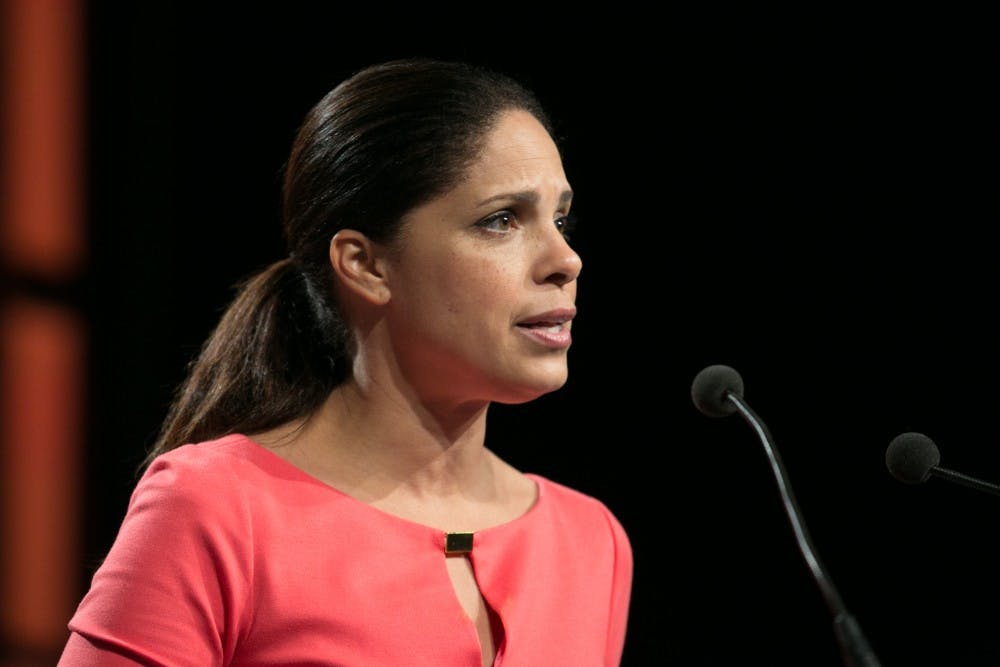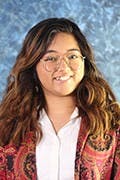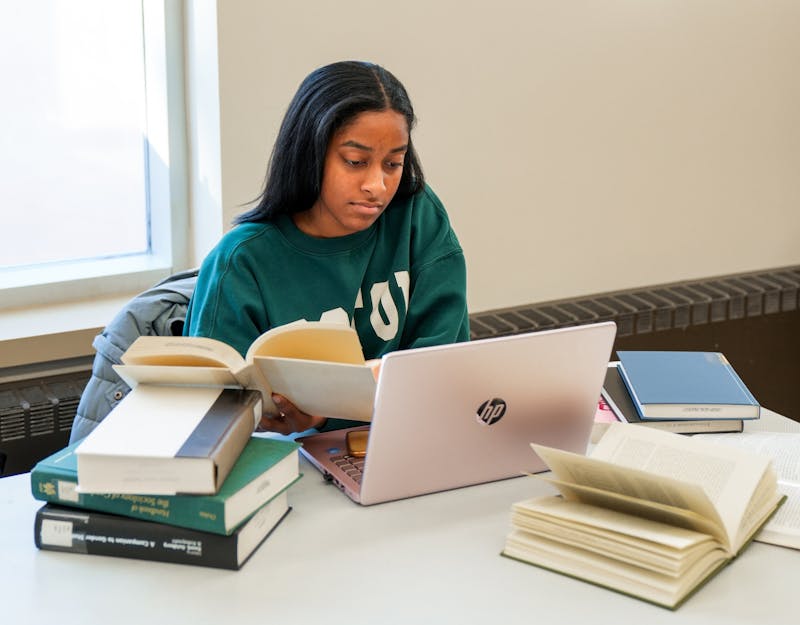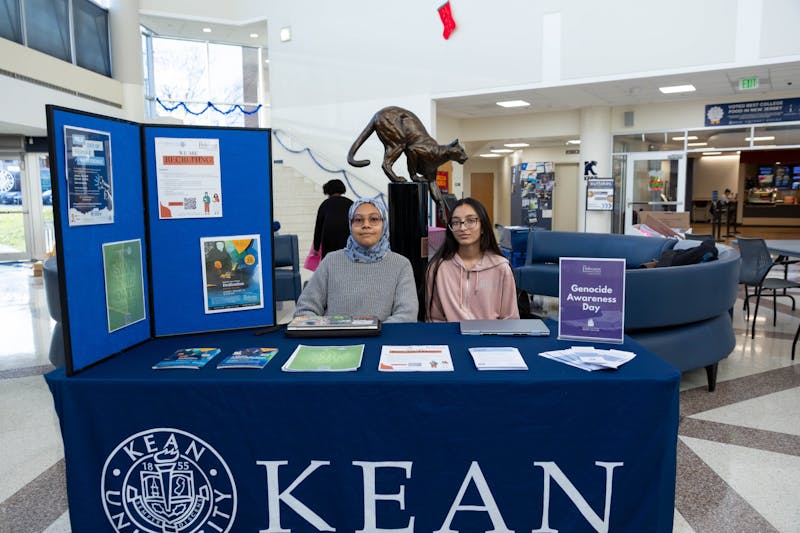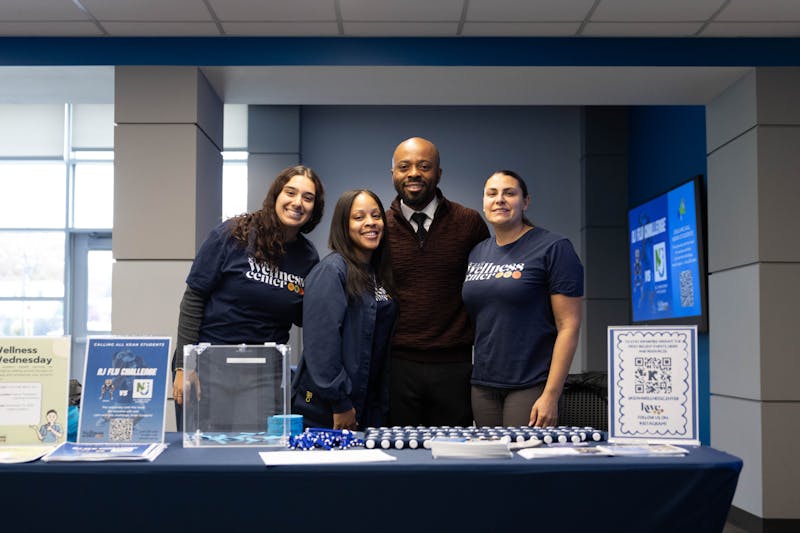On Tuesday, March 20, Soledad O'Brien came to Kean University to discuss the #MeToo movement and its effects as part of Kean's Distinguished Lecture Series.
The lecture took place at Kean's STEM Building and began with an opening by President Dawood Farahi, Ph.D., who discussed the importance of women and minorities within Kean's community. The moderator for the night, Elizabeth Hyde, Ph. D., then came up to introduce speaker O'Brien.
O'Brien is an accomplished and renowned journalist, producer and philanthropist. Some of her works include the political show Matter of Fact with Soledad O'Brien, the crime series Mysteries & Scandals on the channel Oxygen and the documentary series In America. She is also the co-founder of the PowHerful foundation, which is dedicated to providing financial assistance, opportunities and mentors to young women attending college.
O'Brien began explaining how she started her TV news career in 1987 with the job of removing staples off of bulletin boards for WBZ-TV in Boston. From there, she persevered and continued to climb the social ladder, eventually creating a 30-year-long career as a TV journalist and producer. Still, she can recount how her butt was groped by a drunk man at the bar she was interviewing in, causing her to freeze and fumble through her first TV appearance. Although she was able to continue working local news, she never forgot that moment. When she had talked to her boss about it, he had insinuated that it was her fault for placing herself in close proximity to a drunken man. Since then, she is forced to always consider how she is standing, what she is wearing, how close people are to her and what she may be unintentionally inviting. This is a reality many women are faced with.
The #MeToo movement began in October 2017 by Tarana Burke on Twitter. The hashtag has since exploded as women from all over share their stories of sexual harassment in order to emphasize the weight of the problem. By sharing their own experiences, women typically feel empowered and better in control of what had happened to them.
The movement was strongly backed by big Hollywood stars like Gwyneth Paltrow, Jennifer Lawrence, Meryl Streep and Natalie Portman. The movement has continued on past Twitter to extend to colleges, workplaces and countries outside of the United States of America.
Although the concept of women being sexually harassed is not new, there was no term or conversation about the subject until after the 1970s. The modern day problem is defining what sexual harassment is exactly and the necessary consequences for the varying degrees of types of sexual harassment. Adding to the problem is business' human resources offices' habit of inadequately responding to complaints of sexual harassment. Human resources typically lends itself to assist the company more so than its employees. Furthermore, women who do end up sticking up for themselves will likely lose their job and career in their desired field.
O'Brien pondered over the importance of #MeToo in the advancement of women's empowerment and the conversation about sexual harassment. She explained how this movement is almost like a "court civil rights struggle" and went on to explain her parents's civil rights struggle.
O'Brien was born to an Australian father and an Afro-Cuban mother. Her parents had met going to daily mass. After a lot of persistence from her father, O'Brien's mother eventually agreed to go on a date. Unfortunately, as it was 1958 in Baltimore, Maryland, having an interracial relationship could have gotten them shot, and they instead proceeded to date stealthily. To marry they had to travel to Washington D.C. where interracial marriages were legalized and returned to Baltimore, Maryland and lived as an illegal couple. O'Brien explained how her mother recounted how people used to spit on them when they walked around in the early 1960s. When O'Brien asked her mother about her reaction, her mother responded saying, "You know Lovey, we knew America was better than that."
O'Brien explains that her mother's response fascinated her and made her realize the importance of using one's voice to be part of the solution, rather than feeding in to the hate. For America to get to where it needed to be, those persecuted had to help turn it around.
O'Brien then related this idea to the #MeToo movement. She recounted how much data we have today on sexual harassment and the many offenders or victims who have since lost their job or been incarcerated since its beginning. She posed the question, "How do we think about what '#MeToo' has to become in order to make America better than that?"
O'Brien notes the need for women and men to come together in order to eradicate the problem. Shared dialogue is necessary in order to create what could become the new moral code and cultural customs for everyone in the workplace.
O'Brien then presented advice from Gretchen Carlson, a TV commentator, author and chairwoman of the Miss America Board of Directors on what women could do now about sexual harassment. Carlson shares that women must document their experiences, find out what the tape recording laws of one party consent is in their state, seek out help from an attorney to start the process, tell trusted colleagues to get support and encourage men to help women with their allegations.
O'Brien clarifies that while this was great advice, it is not a solution. O'Brien concluded her lecture, emphasizing the need for this conversation to be continued in order to figure out the complicated issue.
O'Brien left a lasting impression asking, "What is the thing you can do? Because it's going to come to your door at some point. It just will."


